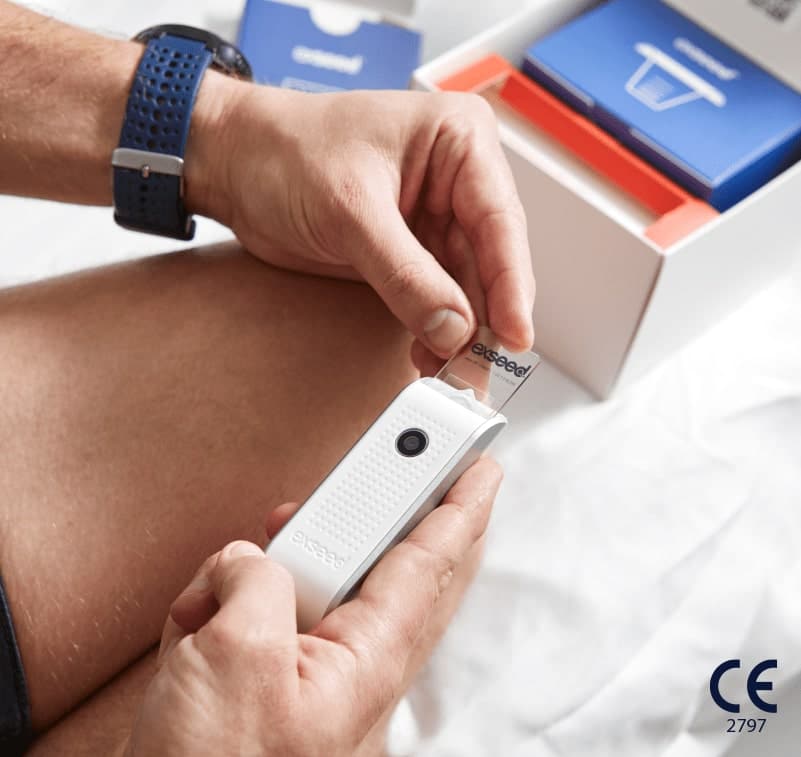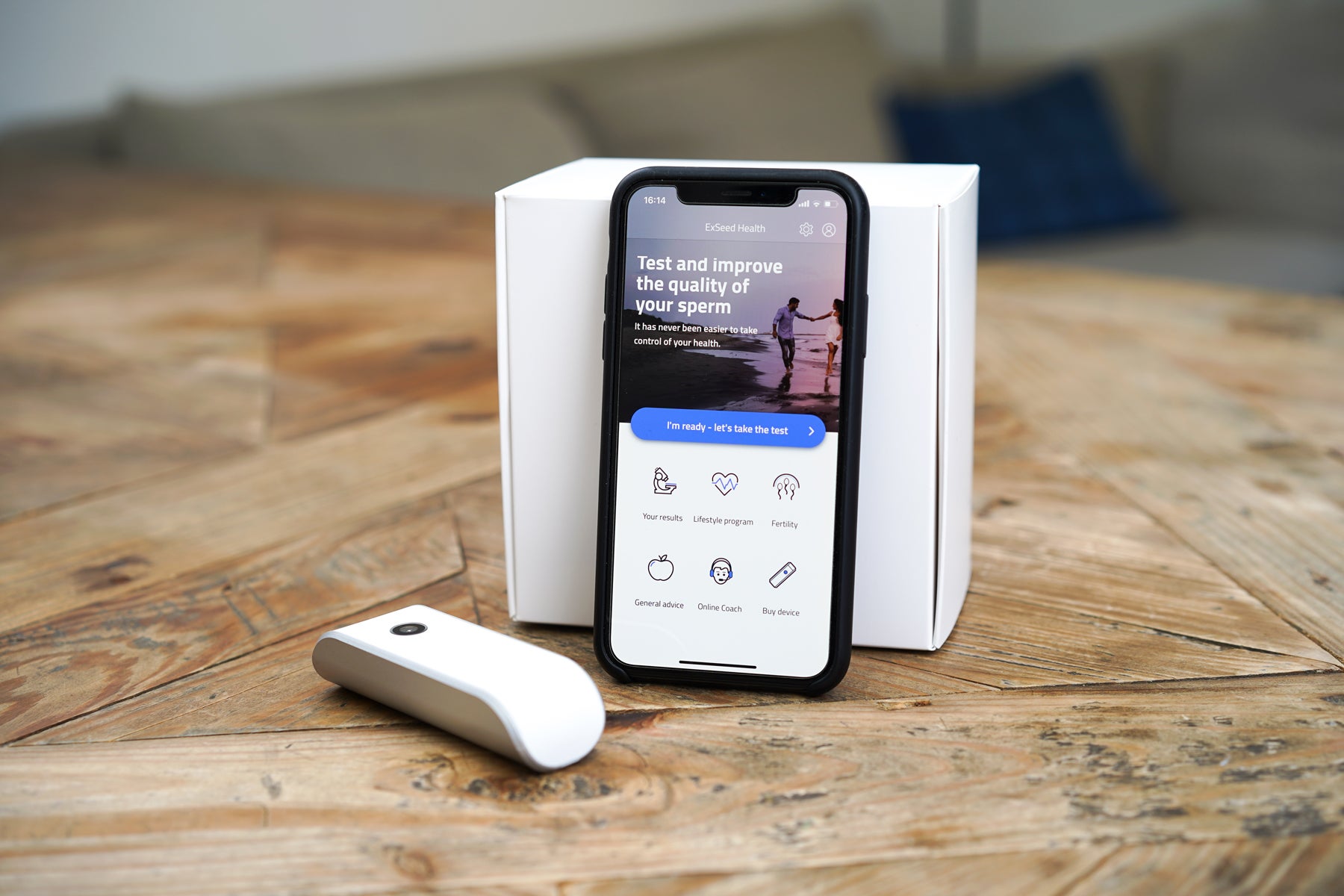The health app letting men take DIY fertility tests
Instead of invasive tests, ExSeed Health is allowing people to address issues of male infertility from the comfort of their own home, writes Leah Montebello

In a time where self-testing has become the peculiar norm, Morten G Ulsted and Emil Andersen’s ExSeed Health beckons a new age for fertility testing.
Not only do their home testing sperm kits tell men the volume, motility and concentration of their sperm within minutes, but it also gives the results directly via their smartphone. All you need to do is produce the “sample”, scan it across to the ExSeed team, and 95 per cent accurate results will be sent back almost immediately. As easy as scanning a pub QR code, ExSeed tells you what the situation is and actionable steps needed to improve it.
In an attempt to “democratise access to healthcare”, says Morten, ExSeed has lowered the price of their test kits compared to private clinics, with packs starting from £74.99 (or roughly £30 per test). “Infertility is defined as a disease by the World Health Organisation. It has tremendous psychological and emotional impacts on a couple. We should start treating it as a disease and actually do something about it,” he urges.
The idea started with Andersen, who had been working on his PhD in a Copenhagen lab, examining how certain lifestyle decisions impacted the quality of stem cells. Employing microscopic technology to sex cells, he discovered that tests could be scaled into people’s homes through their mobile phones. As an IVF baby himself, and recent father to a newborn son, Andersen describes his relationship with the project as one that is embedded with “a natural empathy towards those who cannot conceive”.
In late 2016, Andersen was connected to Ulsted by Daniel Gewecke Daugaard, a mutual friend and eventual co-founder, introducing him as “the crazy cool scientist who can show sperm cells swimming on your smartphone”. With a background in healthcare and business strategy, Ulsted saw immediate potential in the technology.
“I had a conversation with Emil on the Wednesday and by the Friday evening, I was in the lab with his massive prototype, placing my smartphone on the sample. I thought this is spectacular!” he laughs.
At the time, Morten was working at Novo Nordisk, the global diabetes company, and was keen to turn his hand at being an entrepreneur. Tapping his sleep tracking wristwatch and iPhone apps, he tells me, “I’ve always loved technology and the Internet of Things. I was so excited to see what we could do with Emil’s work”. Gewecke Daugaard, Anderson and Ulsted launched ExSeed Health in 2017.
Male infertility just goes straight to the heart of what we are supposed to be. As men, we are supposed to be virile and to father children; it is a little bit of toxic masculinity at play
However, what is most compelling about their offering, and arguably what differentiates them from their competitors, is that they’re not only testing the sperm, but also helping users improve it.
Although the area is undoubtedly nascent, there is a huge body of work that shows the close link between lifestyle decisions and the probability of conceiving. And whilst both founders are humble about the sometimes serendipitous nature of conception, they both call sperm the “low hanging fruit” in treatment.
With 40 per cent of all infertility linked to male-related issues, they cite their very own head of medical affairs, Dr Fatin Willendrup, as a “success story”. Originally diagnosed as clinically infertile, she conceived two children through IVF, and the third naturally by following the ExSeed programme with her husband. ExSeed programmes are sperm “bootcamps”, including vitamin supplements, nutritional plans, exercise guides and general tips for a healthier lifestyle.

A possibly too good to be true anecdote from both a personal and PR perspective, the ExSeed team remain confident they can deliver results. With a range of testimonials, their data shows that 50 per cent of men who were initially classified into the lower category of sperm (and therefore low likelihood of conception) were able to reach the moderate category in a three month period by following the intervention programme.
But Morten’s mission goes beyond just biology; he believes ExSeed has the ability to shatter taboos around male infertility, and ultimately benefit women too.
Removing the embarrassment of fertility clinic visits, Morten states, “I think somehow even in today’s society, male infertility just goes straight to the heart of what we are supposed to be. As men, we are supposed to be virile and to father children; it is a little bit of toxic masculinity at play”.
He continues, “Instead of having the battle of going to the clinic and letting it become a big issue, ExSeed means that men can address it whenever they are ready, in the privacy of their own home”.

For instance, if results show an urgent need for fertility treatment, users will be immediately referred to ExSeed’s internal medical team to discuss their options, or redirected to local GPs or clinics for next steps. In this way, the national lockdowns were useful in giving ExSeed the chance to embed themselves into public health services with clinic partnerships, ultimately shifting perceptions towards home testing. This reflects the more general move of people looking to their phones for healthcare decisions.
Interestingly, Morten notes how around half of their customers are actually women buying tests for their partners. On this, he urges, “ExSeed is giving men a helping hand. So rather than just letting something go and ignoring it, which a lot of men do, we think it is much more powerful to actually do something – even if it is a woman making the first move sometimes”.
Whether this actually actively benefits women remains to be seen, and whilst Emil is confident that gains can be found for both partners (women avoiding invasive checks and men empowered to track and improve their fertility potential), there is still a suggestion that the onus remains on the prospective mother to manage the fertility decisions.
Nonetheless, as a young woman, it is refreshing to see two 30-something men speak so candidly about the struggles men face when addressing their own fertility, whether it is fuelled by toxic ideals of masculinity or not; they’re leading a conversation.
Defining themselves as primarily a “male health brand”, the reach of Emil and Morten’s digital microscopy is huge. With the potential to go beyond fertility, ExSeed may just be on the cusp of completely reinventing the patient experience, scanning other types of cells, and offering other types of diagnoses that could not only bring about new lives, but also save them.




Join our commenting forum
Join thought-provoking conversations, follow other Independent readers and see their replies
Comments